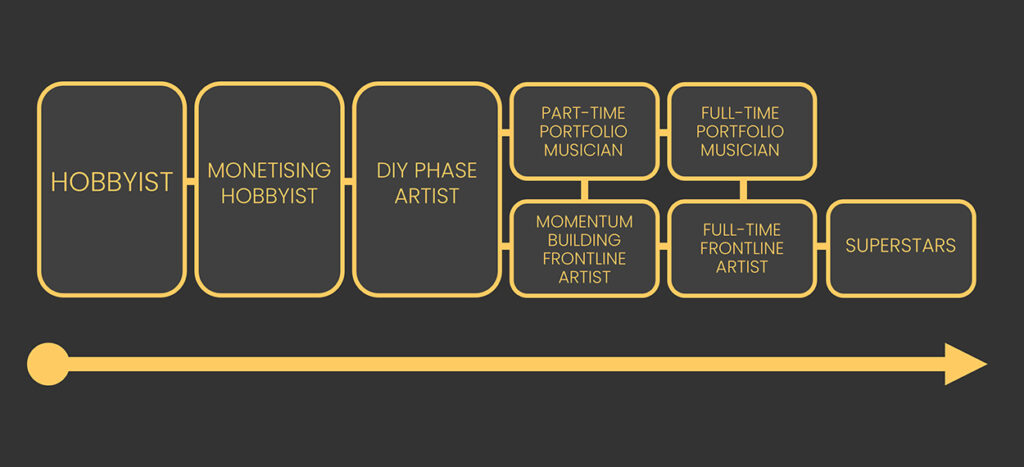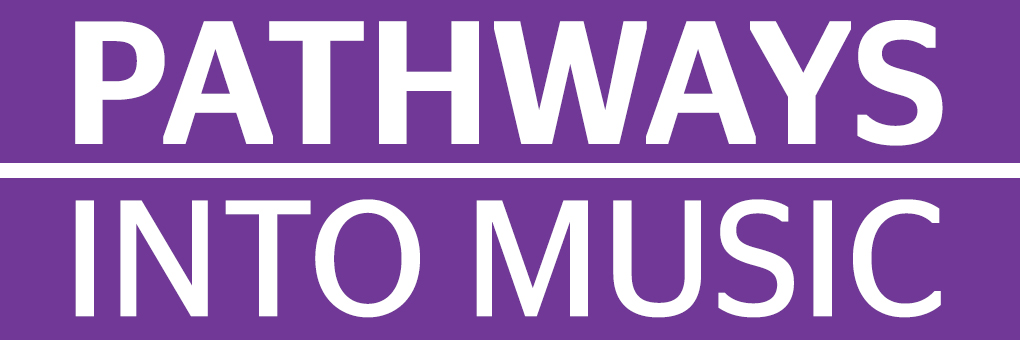This website uses cookies so that we can provide you with the best user experience possible. Cookie information is stored in your browser and performs functions such as recognising you when you return to our website and helping our team to understand which sections of the website you find most interesting and useful.
Pathways Into Music Research
Mapping the music-maker community
Published in May 2022

What do we mean by music-makers? We are using this term to describe all the people who get involved in the creation, production and performance of songs and recordings.
Those people might call themselves a composer, a lyricist, a songwriter, a beat-maker, a singer, a vocalist, a rapper, an MC, a musician, an instrumentalist, a record producer, a sound engineer, a featured artist or a pop star – but they are all music-makers.
There are obviously various ways you can map and organise the music-maker community – including by distinguishing between music composition, production and performance; or based on the specific role any one music-maker plays; or even by genre of music.
However, we have primarily mapped the music-maker community based around purpose – why is the music-maker making music? That creates eight segments.

Hobbyists
This is traditionally by far the biggest segment of the music-maker community – people for whom music-making is a passion and a pastime.
A small portion of this segment may aspire to pursue a career in music – and therefore to generate income from their music-making – but for the vast majority of these people the focus is the simple enjoyment of making and performing music.

Monetising Hobbyists
This is a new and rapidly growing group. Because of digital tools and platforms, an increasing number of hobbyist musicians are recording and distributing their music.
This means recordings made by these hobbyists are available online alongside recordings released by the conventional music industry.
Indeed, as each month goes by, this segment accounts for an ever greater portion of the overall music catalogue available on streaming services like Spotify, Apple Music, Amazon Music, YouTube Music, Deezer and so on.
These hobbyists will generate some income from their music-making, although it is likely a very modest and therefore side income. It’s a passion that makes a little money rather than a job. But crucially, hobbyists are now taking a slice of the music industry’s digital pie.

DIY Phase Artists
Of the monetising hobbyists, a portion will be actively pursuing a career in music, with the ambition of ultimately making a full-time living from their music-making.
That might be as a frontline artist, releasing music under their own name or brand, and building and monetising a fanbase.
Or it might be as a portfolio musician, making music with and for other artists, as well as the music industry, arts organisations, TV and film studios, gaming companies, brands and corporate clients, and so on.
As artists work through the DIY phase they will start to generate more revenue from their music – but they will also likely spend more on their music-making – so overall they are probably making a financial loss at this stage, as they invest in their future music career with both time and money.

Momentum Building Frontline Artists
Making a full-time living as a frontline artist is challenging – and to succeed artists will likely need to work with business partners within the music industry.
Whenever DIY phase artists really start to gain momentum – mainly by finding and engaging a fanbase – people and companies within the music industry will want to partner with those artists, providing support and services in return for a share of the revenues generated and possibly the rights that are created along the way.

Full-Time Frontline Artists
These are the frontline artists who have built enough momentum to make a full-time living from their music in the long-term. This may happen organically over time, with an artist slowly growing their music revenues to the point where they can give up the day-job and focus on their music-making full-time.
Or there may be a period where a full-time focus is possible because of investments made by business partners like record labels and music publishers, the aim being that when the monies those partners have invested run out, actual revenues are sufficient to provide a living.

Part-Time And Full-Time Portfolio Musicians
These are people who make a part-time or full-time living out of music projects. They are usually self-employed, working on an assortment of music projects on a freelance basis at any one time.
The music projects may bring in enough money to constitute a full-time living. Or the portfolio musician may have other jobs or projects to supplement the income from their music projects. In many cases those other jobs or projects may also be within music education or the music industry.

Superstars
Of the full-time frontline artists there will be a very small group who achieve fame and fortune. These people make a significant living from their music-making, and usually have entire businesses built around them and their music, employing many music industry people.

THE EVOLVING MUSIC-MAKING COMMUNITY
The big change over the last 20 years is the emergence of the monetising hobbyist segment of the music-maker community.
As this segment has grown and emerged, the number of DIY phase artists has also grown significantly, because once a hobbyist is monetising their music-making – even at a very modest level – seeking to pursue a career in music seems much more achievable.
What does this trend mean for music education and the music industry?

The impact on music education
For music education, it’s important to recognise that many more students will become monetising hobbyists. Not all of those people will want to pursue a career in music. And, obviously, only a relatively small number will actually be able to pursue a career in music.
However, for this entire segment, making music is not just about composition, production and performance. It’s also about releasing, distributing and marketing music, and navigating the world of music rights.
Although monetising hobbyists will likely discover the digital tools and platforms they can utilise organically online, most of those music-makers also require more bespoke knowledge and information.
For most young monetising hobbyists, it is much easier to connect with music educators than the music industry. But how can music educators – most of whom are more focused on the art of music-making – better provide that knowledge and information?
Plus, of course, many of those young monetising hobbyists will aspire to pursue a career in music, becoming a DIY phase artist.
As noted, pursuing a career in music is incredibly challenging and only a minority will succeed. But the most exciting thing about the digital era is that it is much easier for any music-maker to progress from hobbyist to monetising hobbyist to DIY phase artist.
As they work their way along that pathway, luck will of course play a big role in terms of how far they can progress, but knowledge and information plays a key role too. How can we ensure everyone has a fair chance at building momentum around their music-making by making sure that they have access to the knowledge and information that is required at the DIY phase?

The impact on the music industry
How does the music industry interact with monetising hobbyists and DIY phase artists? Are they part of the music industry? Are they competitors of the music industry? Are they customers of the music industry? Are they a pool from which the music industry can discover new talent to work with?
The truth is, they are all of these things. But it feels like there is still much to discuss in terms of how the music industry interacts with these segments of the wider music-maker community.
For makers of music instruments and music-making tools, the entire music-maker community is a customer base. For those companies providing DIY-level digital distribution and marketing tools, monetising hobbyists are clearly important customers.
For the more conventional music industry, monetising hobbyists and especially DIY phase artists are potential future business partners. But they are also competition. Releases put out by the music industry are competing for consumer attention, actual consumption and digital revenues with the releases being put out by monetising hobbyists and DIY phase artists.
And while each individual music-maker in the monetising hobbyist and DIY phase artist segments is likely capturing a very modest amount of consumer attention, and accounting for a very modest part of actual consumption, and therefore receiving a very modest portion of digital revenues – these segments have become so big that together they make a sizeable impact.
Then there’s the economics of streaming debate. We know that there has been much debate in recent years about the way the digital music market works, and whether the current business models favour certain stakeholders over others.
There have also been various proposals for changing those business models. And there has been much talk about how better data systems are required to ensure digital royalties flow accurately and efficiently. These debates affect monetising hobbyists and DIY phase artists too, but these segments aren’t necessarily being consulted as the debates go through the motions.
All these questions are key to the research work of the Pathways Into Music Foundation. Our existing work has been focused on what knowledge and information monetising hobbyists and DIY phase artists need. Next we will consider how music education and the music industry can better ensure that knowledge and information gets through.






